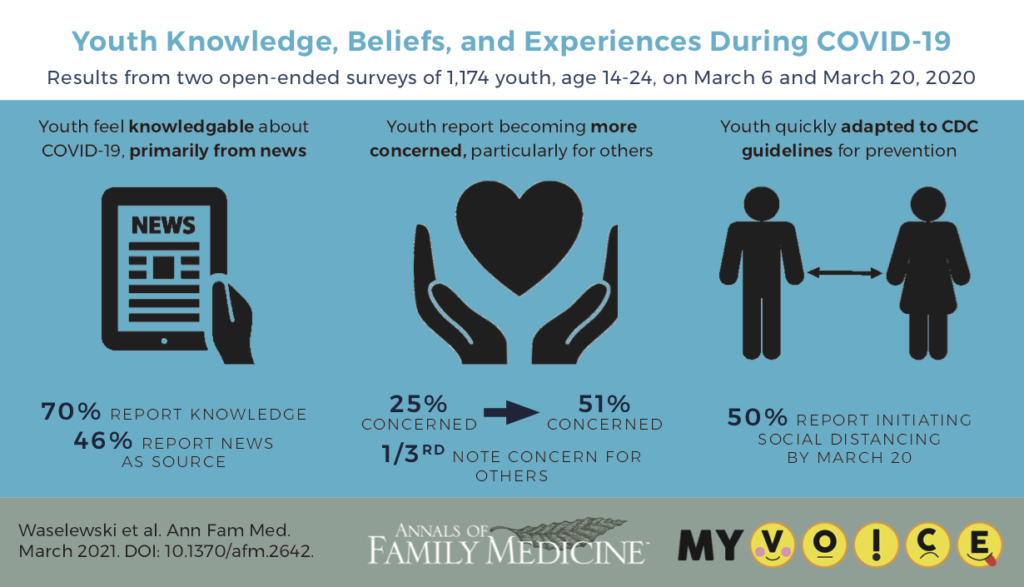Read the original press release from Kara Gavin at Michigan Medicine.

From Waselewski et al’s paper Perspectives of US Youth During Initial Month of the COVID-19 Pandemic, published in the Annals of Family Medicine
Now that teens and young adults across the country account for an increasing share of COVID-19 cases, and many have become eligible for vaccination, several recently published MyVoice studies provide insights into the kinds of messaging that might work best for both preventing transmission and vaccine uptake.
Using national data from MyVoice of people between the ages of 14 and 24 taken at several points in 2020, researchers from the University of Michigan find a clear theme: that most young people are taking COVID-19 seriously and trying to follow public health guidance, and that many of them they are motivated by the desire to protect others.
The latest paper, in the Journal of Adolescent Health ’s May 2021 issue, finds that 86% of young people are moderately or very concerned about spreading COVID-19. At the time the poll was taken, 89% said they wear masks or other face coverings all or most of the time – and the most common reason they gave was to prevent themselves from spreading the coronavirus.
But nearly 20% said that they made exceptions when they were near people they considered close contacts or part of their “pod,” and 16% said they based their mask-wearing behavior on social cues, such as whether they felt they could trust that the people they were with had been cautious about potential sources of exposure.
In mid July 2020, we asked MyVoicers “Do you think you’ll get COVID-19 in the next few months? Tell us why.” Here are a few of their responses, cited in a recent Journal of Adolescent Health paper:
Most likely, I work… as a housekeeper and have been working through the whole pandemic
It is hard for me to imagine getting COVID-19 because I feel as though I’ve been desensitized to it. I don’t personally know anybody who has gotten it, and I’ve still worked my job and done alright in school throughout this pandemic. I will be going to college starting this August, though, and it will possibly pose a threat there
I work in a restaurant drive thru and I’ll be getting a second job as a server in September. People aren’t very considerate and won’t stay home when they’re sick or they don’t wear masks when they’re not eating
I am going back to college dorming and I fear that the school won’t be able to control it
Melissa DeJonckheere, Ph.D., assistant professor, and the first author of the paper says,
“By and large, youth thought they were doing the right thing and following face covering guidelines, even when making exceptions. At the time our data were collected, youth were engaged and concerned about their impact on others, and overall wanted to do their part.”
Kao-Ping Chua, M.D., Ph.D., senior author and an assistant professor of pediatrics, says that the findings have implications for improving messaging to young people around COVID-19 vaccination, as well as mask use. “Public health campaigns should leverage youths’ desire to protect others and not be the cause of spread. Youth may not be very strongly motivated to get a vaccine to protect themselves. A message like “Get a vaccine to protect your grandparents” might be more effective.”
Two other recent MyVoice papers found similarly high percentages of youth reported following rules about social distancing for the most part, but making exceptions for close contacts including situations where young people seemed to be misinterpreting public health guidance. Protecting others was cited as the most common motivation for distancing and following other guidance
Article Citations
DeJonckheere M, Waselewski M, Amaro X, Frank A, Chua K-P. Views on COVID-19 and Use of Face Coverings Among U.S. Youth. Journal of Adolescent Health. 2021;68(5):873-881. doi:10.1016/j.jadohealth.2021.02.01.
Dunn MR, DeJonckheere M, Schuiteman S, et al. “Stay home so this can be over:” A national study of youth perspectives on social distancing during the COVID-19 pandemic. Preventive Medicine Reports. 2021;22:101355. doi:10.1016/j.pmedr.2021.101355.
Waselewski E, Waselewski M, Harper C, Dickey S, Bell SA, Chang T. Perspectives of US Youth During Initial Month of the COVID-19 Pandemic. The Annals of Family Medicine. 2021;19(2):141-147. doi:10.1370/afm.2642.
